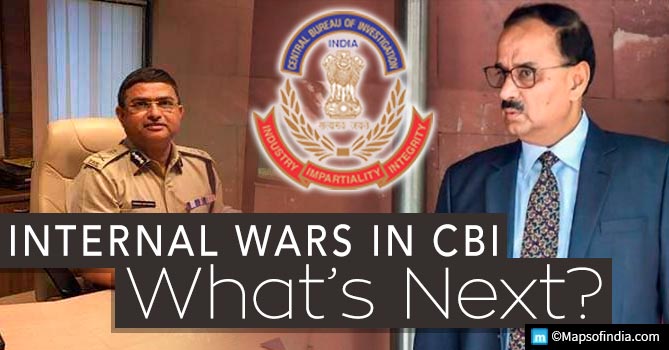Supreme Court Justice severely reprimands CBI for altered investigation reports
Supreme Court Justice, R M Lodha, had severely reprimanded the Central Bureau of Investigation (CBI), dubbing the apex agency as a ‘caged parrot speaking in its master’s voice’, obviously alluding to Government interventions in a CBI inquiry. Such admonishments came when the CBI had submitted the confidential progress report pertaining to its investigation in the Coalgate Scam, which, as of now, is a Supreme Court monitored anti – corruption investigation. The outburst of Justice Lodha stemmed from the fact that the report submitted by the CBI had been heavily altered. The apex investigative agency, CBI, which proudly boasts its motto of “Industry, Impartiality, and Integrity”, had been prompt in denying such accusations, but had admitted of minor alterations being introduced in the report by the Government. However, Justice Lodha was of the opinion that the ‘heart of the report’ had been changed.
While CBI spokeswoman Dharini Mishra commented that, “The CBI conducts all its investigations in a free, fair and impartial manner as per the law”, Justice Lodha’s severe reprimand, was in fact, the official voice of the discontent of the opposition that the apex investigative agency is nothing but a mere tool in the hands of the Congress led UPA II Government to cover up corruptions and scams.
Former CBI Directors had informed Reuters that, the agency is always under a political pressure, independent of the party forming the ruling Government. Former Director of CBI, Joginder Singh, recalling the bitter circumstances under which he was forced to retire, commented, “The political class will never give independence to the CBI”. Vijay Shankar, Director of CBI from 2005 to 2008 reaffirmed Mr. Singh’s statement though he refrained from recollecting any personal experience.
Government turns down all claims of the CBI to be declared as an autonomous body:
Centre’s perspective of the Supreme Court opinion pertaining to the autonomous function of the CBI, can best be described as that of an impasse. Centre had brushed off CBI’s claim for more authority for its director with a minimum of three years tenure in the office, had been literally dismissed on the grounds of the argument that granting the CBI Chief absolute power without any constraints or counterbalance might evoke the chances of a ‘potential misuse’ of power. The Centre furnished an affidavit denouncing CBI’s objection for an answerability authority for the agency. The Centre’s affidavit clearly mentioned that, there is an imperative need for an ‘external independent and strong watchdog’.
CBI’s appeal for an autonomous body spearheaded by the CVC, entitlement to the powers to indict senior Government functionaries and the possession of such powers, had been similarly met with a strong objection from the Department of Training and Personnel (DoPT). As mentioned in the 22 page affidavit of the Centre, “An all powerful Director CBI without adequate checks and balances would not be consonant with the settled constitutional principle and would always carry the risk of potential misuse and may not be conducive to fearless and independent functioning of the organization at all levels. Therefore the averments of the CBI are not agreed with”.
The Centre had also opposed the claims of the CBI to entitle the Director of the agency with absolute punitive clout over its Group A Officers. The argument, that had been cited in the affidavit pertaining to this issue went as follows, “It is not desirable to create new precedence which would create heartburn and dissension in similarly placed organizations. Vesting complete Disciplinary control of Group A Officers with the Director would not only be against the law but also against the settled principles of administration wherein safeguards have been provided to officers so that they work without fear or favor”. Underlining the fact, that the agency exists outside the grasp of the RTI, the Centre had strongly advocated the necessity of a custodian authority. Dubbing the absolute autonomy of the agency as ‘authority without accountability will be draconian’ the Centre had further insisted that, under such conditions the inner surveillance apparatus of the CBI will be thwarted against delivering dissatisfactions, regarding its own officers and may also be unable to hold the director answerable in the event of any questionable action in the course of an investigation.
As further mentioned in the Centre’s affidavit, “There have been instances in the past where allegations of extortion and bribery leading to colored investigation have emerged against some CBI officials. An external accountability commission would only help in furthering the integrity of the examination”. The Centre had also turned down the appeal of the agency advocating a minimum of three years term of office for the director and the proposition that the directors should be appointed from CBI officials only, who had served the agency for a significant period of time in a supervisory capacity. The Centre had argued that, “…..in any case this minimum tenure of two years would not be an impediment in the long term perspective of the organization. It does not preclude a longer term if necessary. Tenures of all senior strategic positions in Government of India are on similar lines”. Dismissing the sanction issue the Centre had reasoned that, the administrative ministry is best disposed to have a clear perspective for the consideration of the quandary of an official in any given set of events.
Government files 22 page affidavits to Supreme Court opposing the proposed autonomy of the CBI:
The above mentioned affidavit had been filed in the Supreme Court by the Government in which the Government had voiced strong disagreements in granting autonomous powers to the CBI. The Government had also argued that, though the CBI director is technically qualified for vesting with the powers of an ex – cathedra secretary, such actions will amount to concentrating excessive power in one individual, which may adversely affect the equations between the Government and the adjuvant agencies. The Government had also expressed its opposition towards establishing any such instances with the CBI apprehensive that such actions may cause severe discontent and dissension in ‘similarly placed organizations’ like Central Armed Forces and Central Police Organizations, and if the claims of the CBI are acquiesced to by the Government, similar demands might be expected of other subordinate organizations.
As quoted in the submitted affidavit, “The vesting of ex – officio Secretary powers upon the CBI Director is strongly opposed as it will seriously jeopardize the scheme of checks and balances envisaged in the governance as well as other deleterious effects it is likely to have on the criminal justice system”. The Centre is under severe criticism from the Opposition for intervening in the investigative procedures of the CBI. While the Supreme Court had called the CBI ‘a caged parrot’, BJP had mockingly expanded the CBI acronym as ‘Congress Bureau Investigation’.
While attending the Golden Jubilee Celebrations of the CBI, Prime Minister Manmohan Singh had promised granting autonomy to the CBI on the condition that the apex agency should abide by the rules of the existing Government. As per the statement of the Prime Minister, “…..it is worth introspecting if the debate on autonomy of the CBI is losing sight of the fact that the CBI and the other investigating agencies are part of the executive”. Finance Minister P Chidambaram, who is spearheading the lobby of the politicians, pressing for the issue of the autonomy of the CBI is congruent with the statements of the Prime Minister as evident from his comment, “We have conceded all the powers that will give you functional autonomy along with investigative autonomy. We have done our best to give you that functional autonomy…..But that autonomous powers must be exercised as a part of the executive government.”
Conclusion – Supreme Court verdict gives CBI the first step to autonomy:
As of 17th, December, 2013, the Supreme Court in a ground breaking verdict had declared that, CBI need not seek Government ratification for the investigation of a ‘public servant’ in a court monitored inquiry. The ruling of the three Judge Bench, chaired by Justice R M Lodha is perhaps the first step of the autonomy that the apex agency had been pining for so long. The ruling comes as a reprieve for CBI, who had already earned the infamy of being a tool in the hands of the politicians!




